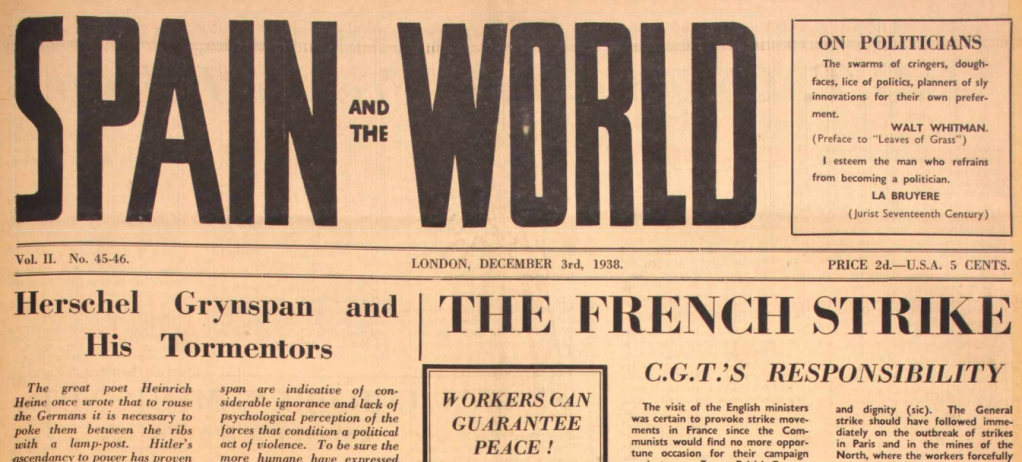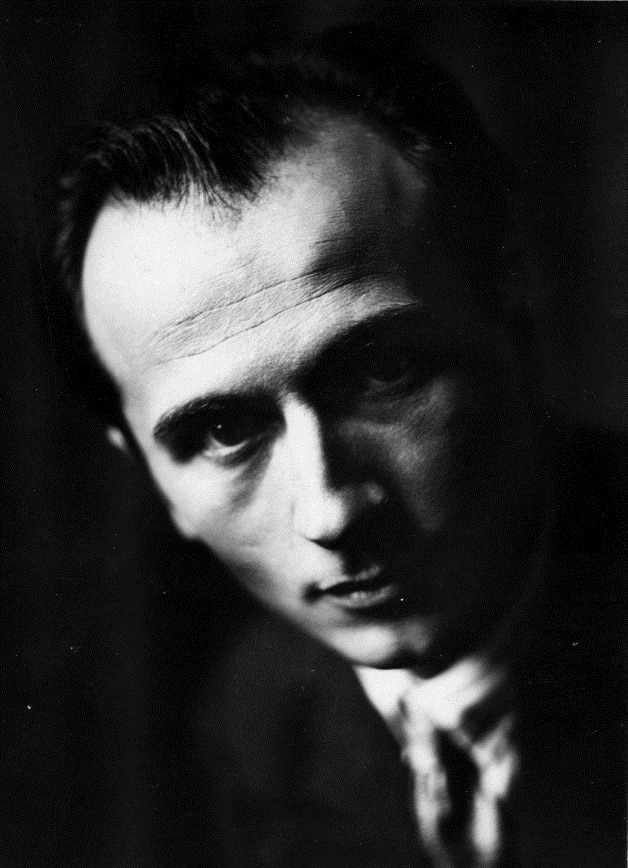
No Ease in Zion
By T. R. Feiwel
(Seeker and Warburg. 12/6)
Reviewed by Vernon Richards in the newspaper ‘Spain and the World’, Dec.3, 1938, London, UK
The first Jews to settle in Palestine were “young Intellectual Russians” who left Russia after the pogroms of 1882 “to devote themselves to simple village life.” But the idea of a Jewish State was first envisaged by Theodor Herzl, a Viennese journalist. His Zionism had very little idealism about it. As Mr. Feiwel remarks “Zionism was essentially a bourgeois and capitalist movement” and throughout the book, in vain does one seek for any traces of idealism in the movement, save in the only too few Communal Settlements which are generally opposed to Official Zionism.
As early as 1920 “in the new Jewish Palestine” the “young and militant Labour Federation already had its ideological difficulties.” The difficulties arose because there was, according to the author a “strong Left Wing of young people” with pronouncedly revolutionary views who rejected all bourgeois ties and advocated militant co-operation between the Arab and Jewish workers. Naturally, as in all capitalist countries, the idealist minority succumbs to the wishes of the Capitalists, and in this case to the Zionist Organisation.
This book can leave no illusions as to the true nature of official Zionism. It is Capitalist to the core. In fact, the Socialist dream was shattered as far back as 1924-25, “The brisk capitalist development in Tel Aviv, Haifa and the cities belt took first place” and needless to say there were “bitter struggles against exploitation.” And the author admits that though Jewish emmigration would continue “it was obvious that the growth of Jewish Palestine under the British regime would be on Capitalist lines and colonial Capitalist lines at that.” And Zionism has since abandoned all attempts at setting up a [Free?] Society in Palestine. Rather has it been the contrary.
Capitalist refugees(!) flocked to Palestine while the poor workers who probably had even in some small measure agitated against Fascism were left behind to face the consequences. The author quite expected this to happen when he wrote “Naturally it was the wealthiest and most efficient Jews who had kept their resources sufficiently liquid, who reached the country first.” This sudden influx of capital created “revolutionary economic changes in Jewish Palestine.” “There was an unprecedented boom in houses, building plots and cities groves, the only ready channels of investment….” land values rose to fantastic heights… “and at the same time the Histadrut grew into a close knit, wealthy body of nearly 100,000 members aiming entirely at consolidating the new nationalism, cementing the new Jewish Palestine into a miniature but solid national entity.”
This passage is full of irony for most of these “colonisers” have escaped from German Nationalism which they have learned to hate by bitter experience, only to create Jewish Nationalism in Palestine. There is some truth in the suggestion that many Jews in Germany would have gladly waved the Swastika if Streicher gave them the chance to do so! Consequently the Zionist attitude towards the Arabs is of interest.
Nine tenths of Zionist opinion — according to Mr. Feiwel, consider that “The Arab does not exist,” which is not exactly the best way to try and work in harmony with the people who have, after all, lived for years in the same land. At least it is not the attitude one would expect from people who have themselves been driven out of a country which they had considered their homeland for generations. And the author shows us how sure the Zionists always were of their strength and of outside support. They reasoned in these terms: “Ultimately British and Zionist interests must surely coincide. And how could a small Arab population challenge the might of British Imperialism” or as in another example the Zionist assumption “that such a Zionist majority (in Palestine) could be obtained without major resistance by the Arabs, implies that the Palestine Arabs do not exist…”
Furthermore one reads “Already the Official Zionist name for Palestine-Eretz Israel… emphasized this attitude.” Also the education of Jewish children in Palestine was nationalist. In fact the whole attitude of official Zionism has been one of non-co-operation with the Arabs.
The Arabs and their cause are dealt with in a very sketchy fashion in a short chapter. The backward conditions of the Arab worker and his domination by the upper class is surely not a reason why these people should be exploited and dominated by a Jewish Capitalist, with the aid of British Imperialism. Nor can one condemn a movement simply because it has “no programme.” The Arab demand for independence is far from vague in its significance.
The Arab leaders writes Mr. Feiwel show through their writings and their speeches that “they still only half grasp the real world” and have besides, most vivid imaginations. That may be true, but Herzl had a vivid imagination (“the Jewish bankers dismissed him casually as a mad visionary”) and what of Ben Gurion, reactionary and Zionist who laid down a ten year plan for the immigration of one million Jewish families (that is five million people) and all he required was £250 million!
To be sure there is no idealism in the Arab overlords as there is no idealism in the millions of Alfred Mond “the ruthless chief of Imperial Chemical Industries,” but as the author points out, since the war the population “Arabs, Christians, Jews exchanged a decadent Imperial Master for an up-to-date one” and more up-to-date in his ruthlessness. And so long as Jewish immigration to Palestine has as its aim the establishment of a Jewish State where lack of consideration for those outside its circle threatens to shape in a similar fashion to that in other countries, then the Arabs’ cry for independence and their demands that Jewish emmigration should cease seem fully justified.
Mr. Feiwel, after his detailed analysis which while not favourable to the Arabs is hardly flattering to the Zionists, in the chapter “Palestine and the Jews” tries to look into the future of Palestine. The narrow outlook of Zionism will prevent progress being made in Palestine, and again — for it cannot be stressed too often — the lack of consideration for the Arabs who in Palestine “still live at a deplorably low level.”
The persecution of the Jews in Europe today is in our opinion but one problem, and their treatment is not a greater travesty of justice than Mussolini’s murderous attacks on the Abyssinians or on the Italian workers who still fill his gaols, nor of British Imperialism’s policy in India, nor of International Fascism’s campaign of extermination in Spain.
We say with Mr. Feiwel that “today the question of the Jews of Europe has become one which must be solved together with all others — or, together with them, fail to be solved.” And we further add that Zionism will not solve the Jewish problems.
The Jewish workers must now unite with the Arab workers, before hatred and suspicion create an unsurmountable barrier, which will make it virtually impossible to rid Palestine of British Imperialism and Arab and Jewish Capitalism, for many years to come.
V.R.
[Note: This review itself is untitled in the issue of Spain and the World in which it appears, but falls under the section heading Palestine – Idealists and Capitalists. Richards was a co-founder of the newspaper. I’ve also added some extra paragraph breaks for increased readability. M.Gouldhawke]

Marie-Louise Berneri & Vernon Richards
Excerpt from ‘La Palestina insanguinata’ – Camillo Berneri (1929)

“Which side is right? The Arabs. Sentimentality is out of place. The world’s press may well have recorded the Jewish victims and depicted the horrendous scenes of the massacre of defenceless Zionist colonists; there may well be a just tradition of pity towards the Jewish victims of absurd and unjust laws and of the pogroms which massacred them; the efforts of the Zionists may well be admirable, but all this is counterbalanced by the weight of the Arab victims, by the fact that Zionism serves as a screen for English imperialist policy, by the regime of inequality which dominates in Palestine […]
The Arabs have watched as hundreds upon hundreds of Jews disembark in Jaffa and Haifa, they have seen their most fertile lands occupied by Jews, they have seen fall into Jewish hands lands which have been made fertile by the labour of Arab farmers, they have seen the lion’s share of public monies going towards the benefit of the Zionist community, they have watched land bought for a few shekels sold for astronomical sums… the demographic factor is not the central factor. What worries those in the area is the nature of Jewish immigration, economically selected and technically endowed with capital. The Immigration Ordinance of 1925 in fact states that Jewish immigrants must have an annual income of at least 60 pounds sterling or a minimum of 250 pounds sterling in capital.”
[Source: quoted in the article ‘Anarchists in Israel: An Important Presence‘, the quote itself sourced from ‘Vogliamo’, No.4, Anno 1929]
Excerpt from ‘What can we do?’ – Camillo Berneri (1936)
“The operational base of the fascist army is Morocco. We must intensify our propaganda in favour of Moroccan autonomy throughout the pan-Islamic area of influence. We must dictate to Madrid unambiguous declarations announcing the abandonment of Morocco and the protection of Moroccan autonomy. France would anxiously envisage the possibility of insurrectionary repercussions in North Africa and in Syria; Great Britain would see the movements for self-rule in Egypt and among Arabs in Palestine growing stronger. We must exploit such anxieties by means of a policy which threatens to unleash revolt throughout the Arab world.”
Other languages:
Palestina: Idealistas y Capitalistas, por Vernon Richards (1938)
Palestine : Idéalistes et Capitalistes, par Vernon Richards (1938)
See also:
Anarchists & fellow travellers on Palestine (2023)
Against the Destruction of Gaza, For the Liberation of Palestine (2023)
What can we do?, by Camillo Berneri (1936)
Anarchist Tactic for Palestine, by Albert Meltzer (1939)
Zionism, from War Commentary (1944)
Fine Day For The Race, by Albert Meltzer (1947)
Palestine, by Albert Meltzer (1948)
Letter in memory of Marie Louise Berneri, from George Padmore (1949)
Anti-Semitism and the Beirut Pogrom, by Fredy Perlman (1983)
The Continuing Appeal of Nationalism, by Fredy Perlman (1984)
The Cairo Mutiny; Bounty on the Mutiny, by Albert Meltzer (1996)
Settler colonialism and the elimination of the native, by Patrick Wolfe (2006)
Anarchism & Indigenous Peoples